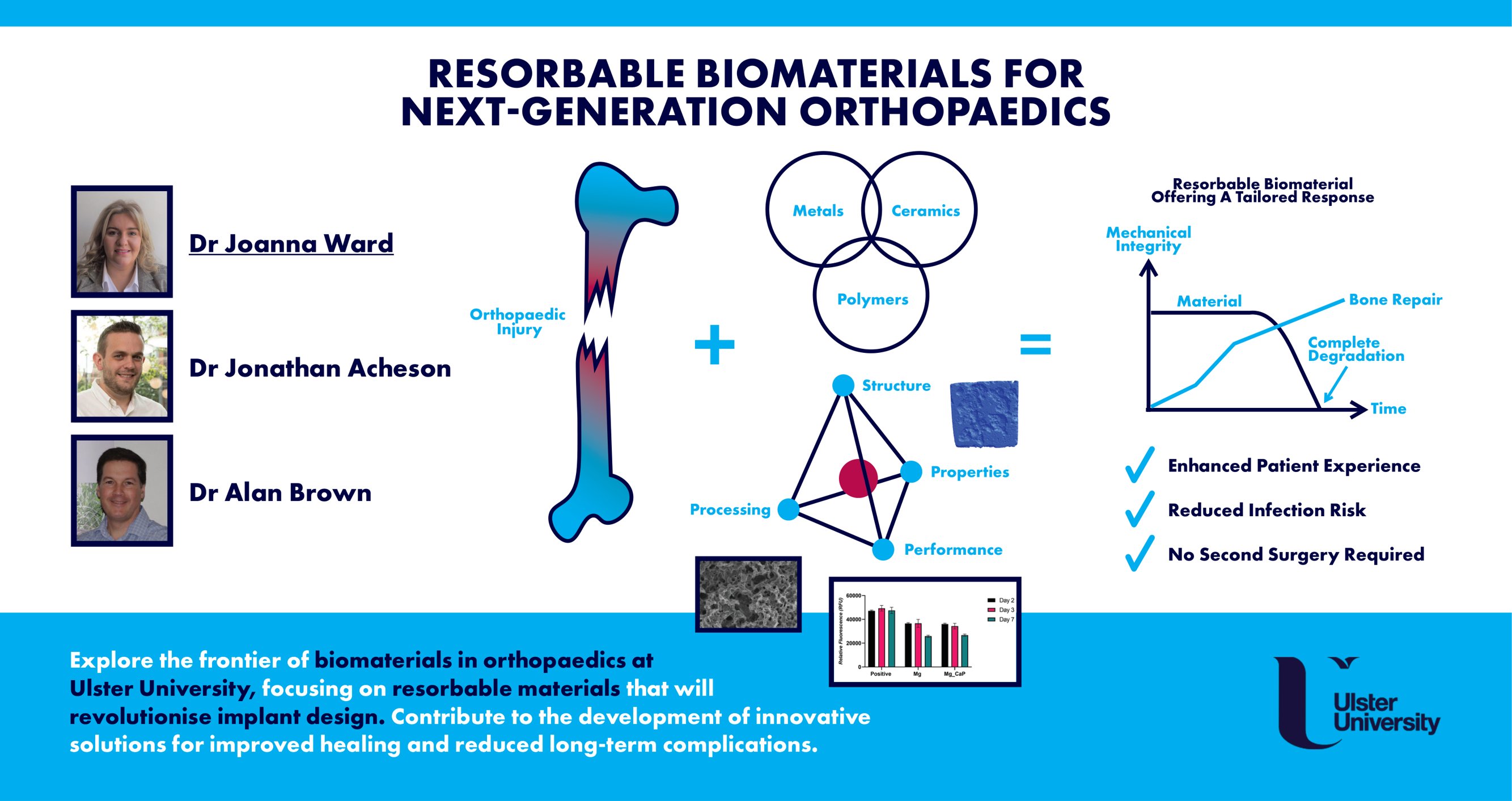PhD Study: Resorbable Biomaterials: Embark on a groundbreaking PhD opportunity in Resorbable Biomaterials for Next-Generation Orthopaedics. This funded research project, situated within Computing, Engineering, and the Built Environment, addresses the challenges associated with current orthopaedic implants, aiming to improve patient outcomes and reduce the need for second surgeries.
Designation: PhD Researcher
Research Area:
- Resorbable Biomaterials
- Orthopaedics
- Implant Design
- 3D Cell Culture Analysis
- Coating Techniques
Location: Computing, Engineering, and the Built Environment Department
Eligibility/Qualification:
- First or Upper Second Class Honours Degree in a relevant subject.
- Equivalent qualifications, such as a Lower Second Class Honours Degree plus a Distinction in a Master’s Degree, may be considered.
- Comprehensive research proposal showcasing a sound understanding of the subject area.
Job Description:
PhD Study: Resorbable Biomaterials for Next-Generation Orthopaedics
The research focuses on developing multi-functional bioresorbable implants using advanced coating techniques. The aim is to create implants with properties closely mimicking natural bone, ensuring controlled degradation and sustained support for repairing bone tissue. The project integrates 3D cell culture analysis to replicate dynamic human tissue conditions, contributing to the advancement of orthopaedic implant design and enhancing the overall patient experience.
Desirable Criteria:
- First Class Honours (1st) Degree
- Master’s degree with a 65% or higher
- Relevant work experience related to the proposed project
- Peer-reviewed publications
Funding and Eligibility: The University offers a Department for the Economy (DFE) scholarship covering tuition fees at the Home rate, a maintenance allowance of £19,000 per annum for three years, and a research training support grant (RTSG) allocation of £900 per annum for three years. Eligibility criteria include residency requirements, and certain applicants may qualify for full funding based on EU Settlement Scheme status or Republic of Ireland (ROI) residency.
How to Apply: Submit applications through the university’s online application portal. Include a comprehensive research proposal, CV, and academic transcripts. Ensure all materials are submitted before the application deadline.
Last Date for Apply: Application deadline is 8 January 2024 (15:00 CET) for entry in September 2024. Reference letters must be submitted by 14 January 2024 (23:59 CET). Late submissions will not be considered.

Disclaimer: This job post is sourced from a reliable publication. Applicants are encouraged to verify details and obtain further information from the official website of the University. For additional information, refer to the FAQ page or contact the provided email address.
- 💡 Traumatic Bone Injury:
- Approximately 2.8 million people are affected annually.
- Current treatments involve metal alloys like Titanium and Stainless Steel, causing potential issues with degradation of natural bone.
- 🔄 Bioresorbable Implants:
- Magnesium is a bioresorbable metal with properties closer to natural bone.
- Requires surface and/or bulk modification to control degradation for sustained support.
- 🧪 3D Cell Culture Analysis:
- Traditional cell culture methods lack dynamic conditions.
- 3D cell culture allows a more realistic representation of human tissue for studying biomaterial interactions.
- 🛠️ Research and Implant Development:
- Research focuses on applying coating techniques for a multi-functional bioresorbable implant.
- Aims to improve implant design, enhancing the patient experience and reducing the need for second surgeries.
- 🎓 Essential Criteria for Applicants:
- Applicants need a First or Upper Second Class Honours Degree or equivalent.
- Comprehensive research proposal demonstrating a sound understanding of the subject area.
- 🌟 Desirable Criteria:
- Consideration for interview may include a First Class Honours Degree, Master’s at 65%, relevant work experience, and peer-reviewed publications.
- 💰 Funding and Eligibility:
- University offers Department for the Economy (DFE) scholarship covering tuition fees and maintenance.
- Additional research training support grant provided.
- Various eligibility criteria apply, including residency requirements.
- 📚 Recommended Reading:
- Provides a list of relevant publications for further reading.
- 🏛️ Ulster University’s Doctoral College:
- The institution overseeing the research and doctoral programs mentioned in the text.








